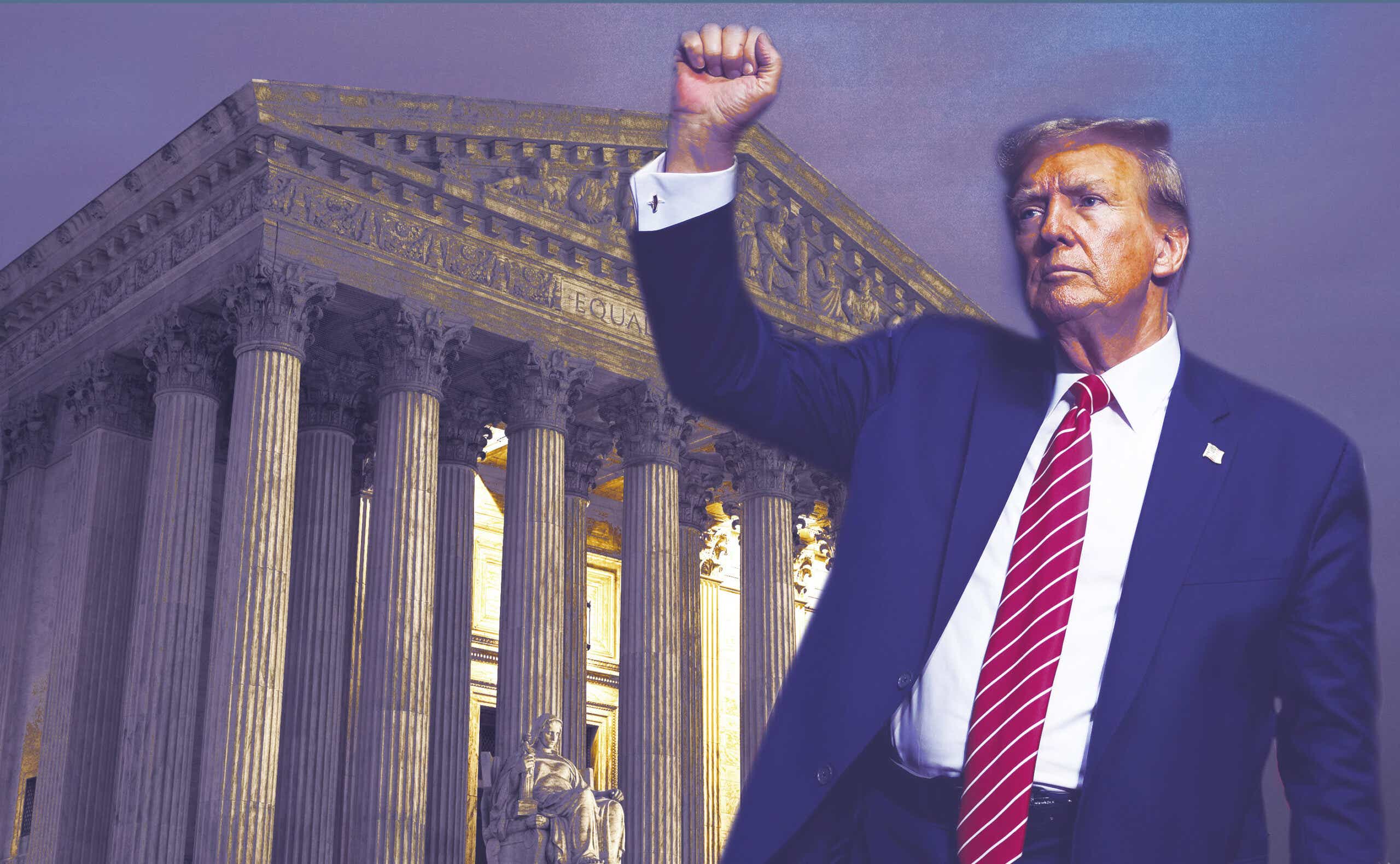The Supreme Court just handed down its long-awaited decision in former President Donald Trump’s 2020 election interference case. Now, some worry that the court's verdict on Monday puts him (and other presidents) above the law, allowing them to act with impunity.
Following a 6-3 vote, the court’s conservative majority ruled in Trump v. United States that the Republican is immune from criminal prosecution for some of his actions during the insurrection on Jan. 6, 2021. However, the justices also left many unresolved questions, sending the case back to a lower court for further proceedings. This move almost certainly pushes any trial in the insurrection case well past Election Day, marking a victory for Trump and leaving many voters in the dark.
“For Donald Trump, frankly, it was a win even before we got the decision today because the court took months and months to resolve this,” former acting U.S. solicitor general Neal Katyal told Katie Couric on Monday.
Watch Katie and Neal's full conversation in the video below, and read on for more on what’s next and what this means for Trump’s other criminal cases.
What was the Supreme Court's ruling on Donald Trump's immunity?
In his majority opinion, Chief Justice John Roberts wrote that Trump and other presidents have immunity from criminal prosecution for "official acts" taken while in the White House, but the ruling left it up to lower courts to determine whether the criminal acts Trump was accused of in his Jan. 6 indictment are protected as "official" or not.
But the verdict didn’t mark a total win for Trump: The Supreme Court rejected his claims that he is entitled to absolute immunity unless impeached by the House and convicted by the Senate. (Such a decision would’ve ended Special Counsel Jack Smith’s prosecution of the Jan. 6 case.)
All three of the court's liberal justices issued dissents, with Justice Ketanji Brown Jackson saying the ruling "breaks new and dangerous ground." Justice Sonia Sotomayor penned the most blistering objection of all, writing that the historic decision effectively ensures that the president “is now a king above the law.”
“Never in the history of our Republic has a President had reason to believe that he would be immune from criminal prosecution if he used the trappings of his office to violate the criminal law,” Sotomayor wrote. “Moving forward, however, all former Presidents will be cloaked in such immunity. If the occupant of that office misuses official power for personal gain, the criminal law that the rest of us must abide will not provide a backstop. With fear for our democracy, I dissent.”
How are legal experts responding?
Legal experts agree that the line between a president’s "official" and "unofficial" acts is far from clear, and they warn that it could enable the president to commit serious illegal acts without facing any real consequences.
“It creates a huge risk that a president can use the official levers of power to subvert democracy with impunity,” Anthony Michael Kreis, a law professor at Georgia State University, tells Katie Couric Media.
Others say the breadth of immunity means that even historic scandals such as Watergate could interpreted differently under the new ruling. “It’s likely that Gerald Ford did not need to pardon Richard Nixon under the interpretation of presidential immunity that this court enunciates today,” David Becker, an election law expert and the executive director of the nonprofit Center for Election Innovation and Research, told the Associated Press.
Some have even called the decision a major loss for American democracy. Katyal says historians will look back at this decision as the day the Supreme Court got it “gravely wrong.”
“You've got this general principle that no person's above the law. Presidents are just like everyone else — Republicans and Democrats alike believe that,” he told Katie. “And now you've got a Supreme Court saying the opposite, and I don't think it's possible to justify. I don't think that this decision will stand.”
What’s next for Trump’s criminal cases?
It’s now up to U.S. District Judge Tanya Chutkan, who’s overseeing Trump's Jan. 6 case, to parse through the allegations to separate Trump’s official acts that he took as president from his private ones when he was acting as a presidential candidate. Even her eventual decision could be further appealed, meaning that a trial is unlikely until well into 2025.
The Supreme Court's ruling will also likely affect Trump’s election inference case in Georgia. Fulton County District Attorney Fani Willis alleges that the former president and his allies tried to overturn the state’s 2020 election results. Though SCOTUS said it could not "neatly" determine whether these acts were official, Kreis is confident it won’t undermine key evidence.
“It’ll certainly complicate what evidence is used, particularly with respect to internal conversations at the White House,” he tells us. “However, much of the conduct at issue is likely to be viewed as unofficial acts related to Trump’s conduct as a candidate.”
But it remains to be seen whether the decision will affect his federal prosecution in Florida for allegedly holding on to classified documents after leaving the White House and obstructing government efforts to retrieve them. He has pleaded not guilty to the 40 counts against him.
These cases aren’t likely to be resolved by November. And if Trump ultimately wins the presidential election, he may never go to trial — he could either order the Justice Department to drop the federal charges against him or issue a pardon for himself. That’s why some are calling on voters to hold Trump accountable.
“We can’t count on the Supreme Court or any institution to hold him responsible. It’s going to be up to the voters in November,” Harry Dunn, a former police officer who defended the U.S. Capitol on Jan. 6, said during a conference call on Monday.









